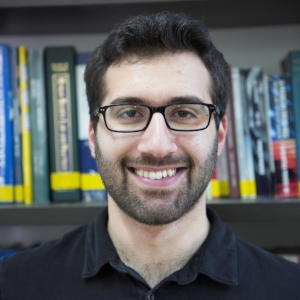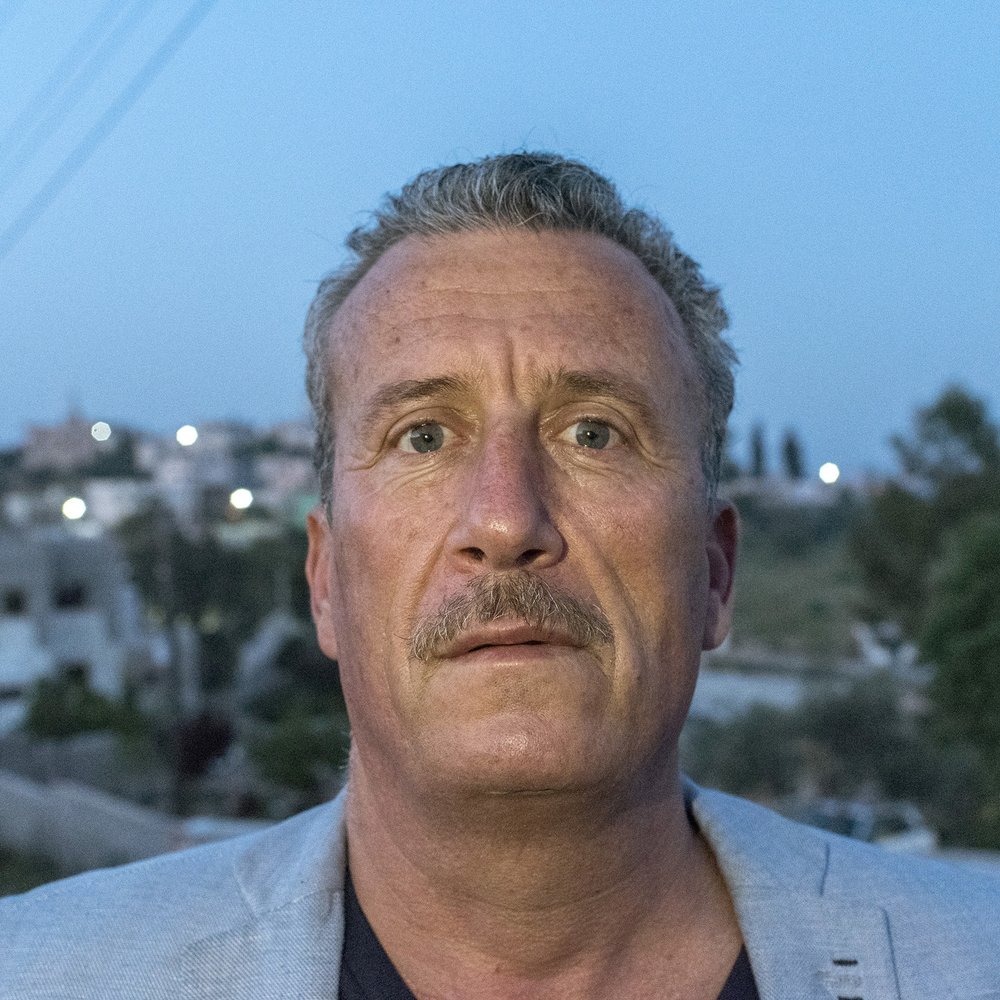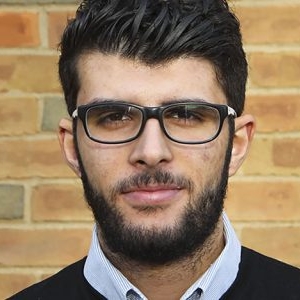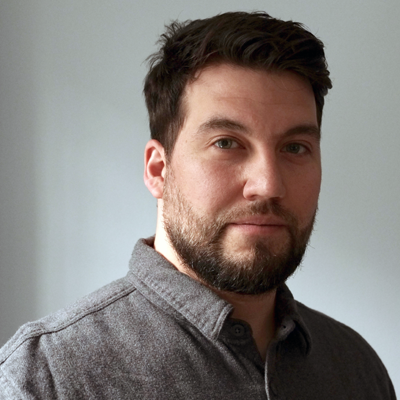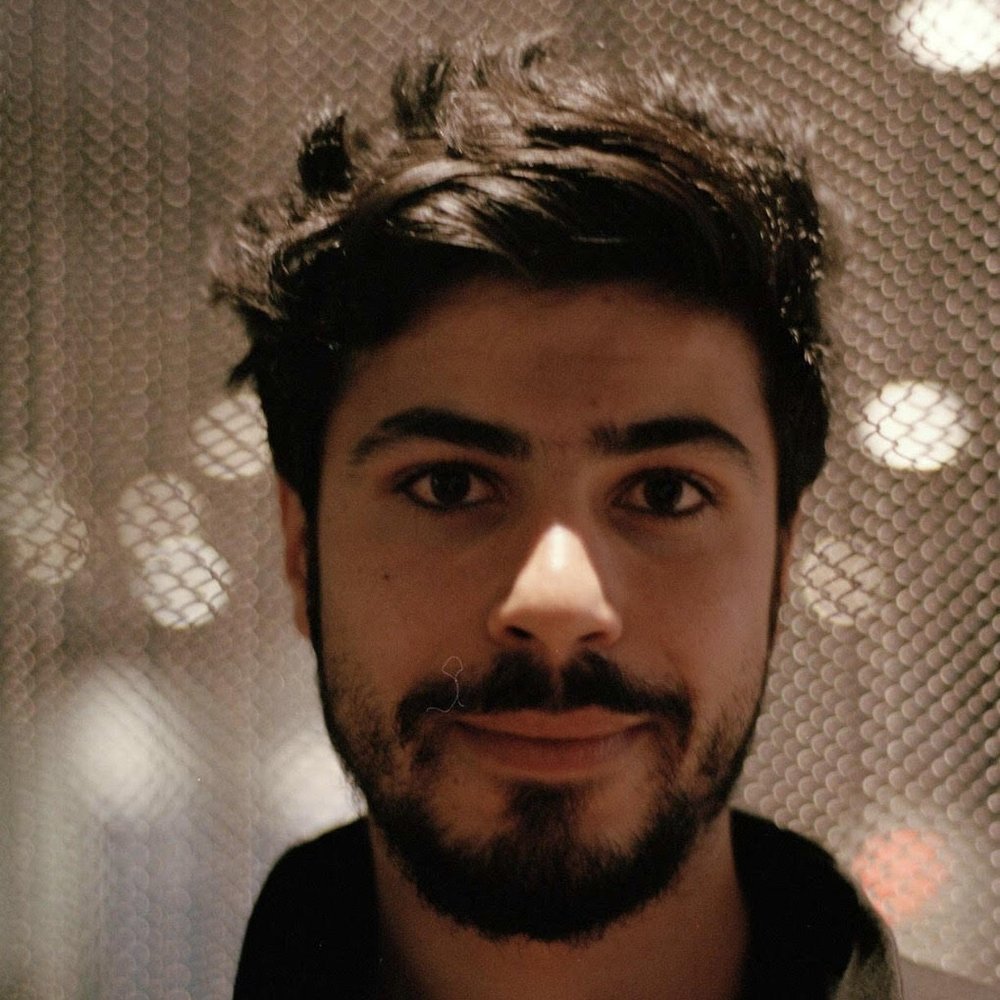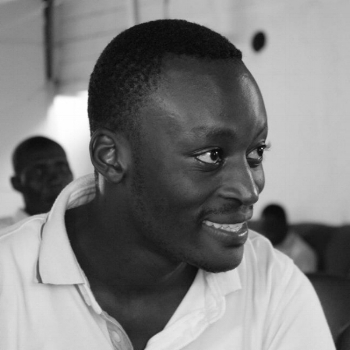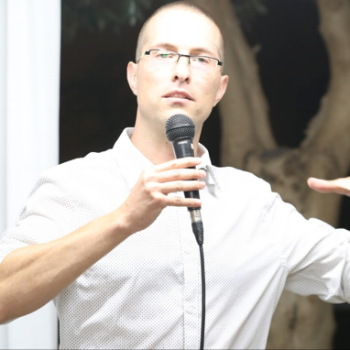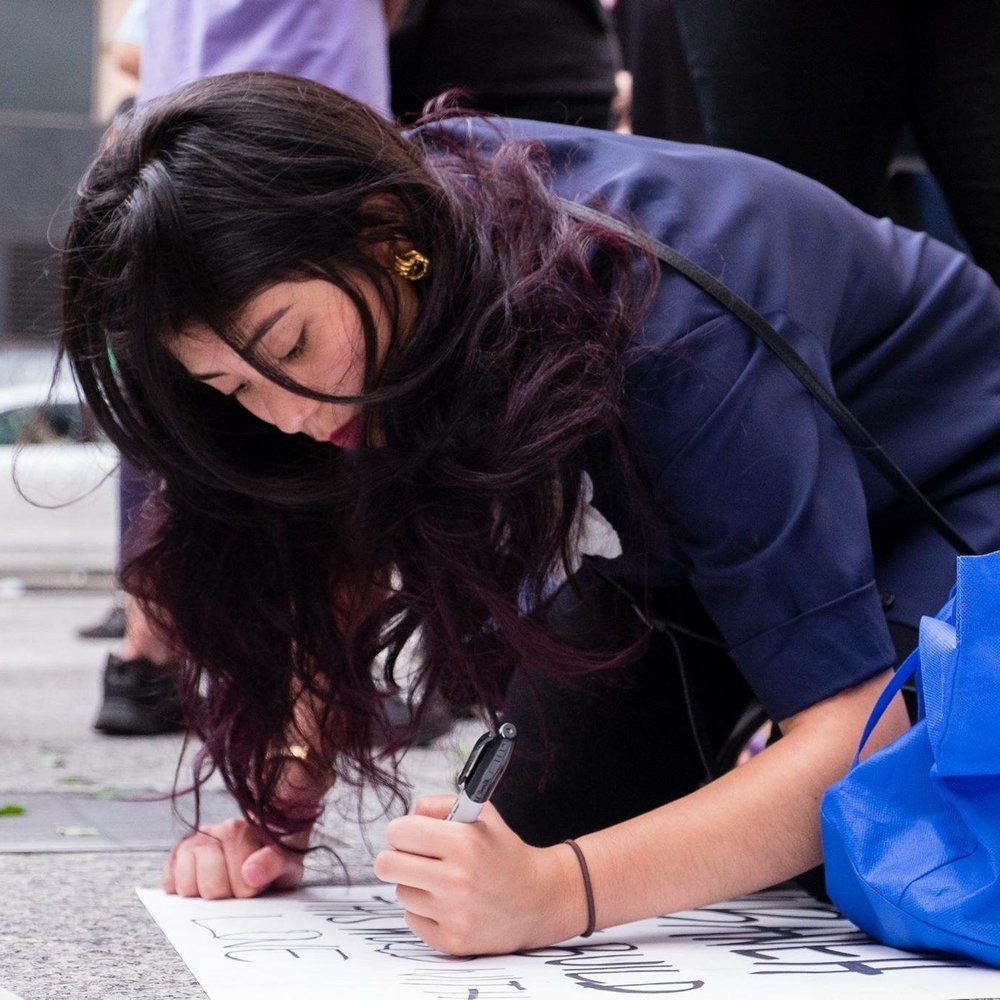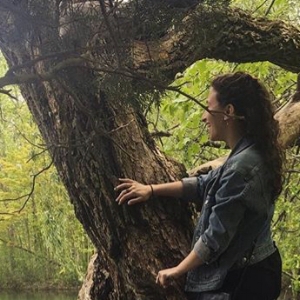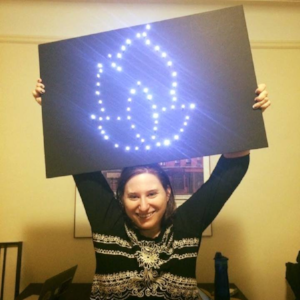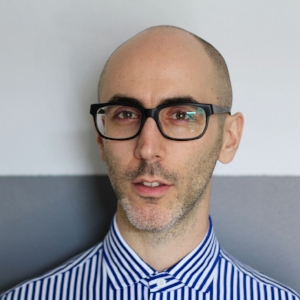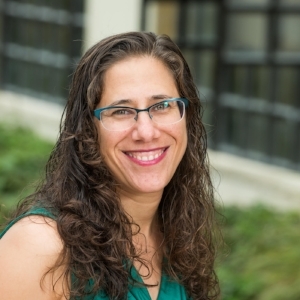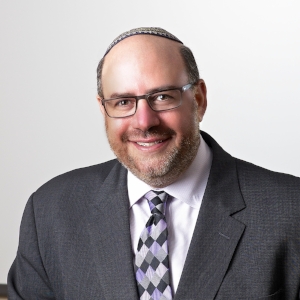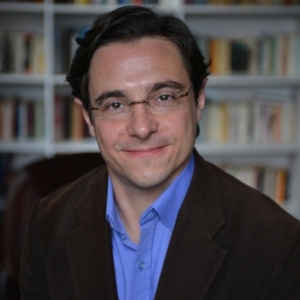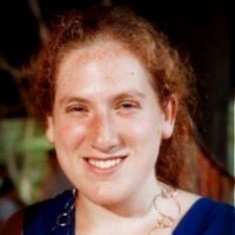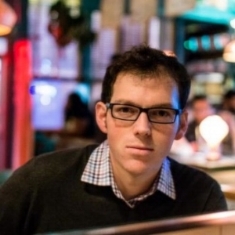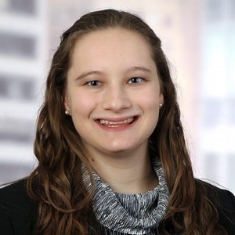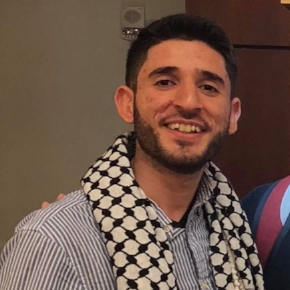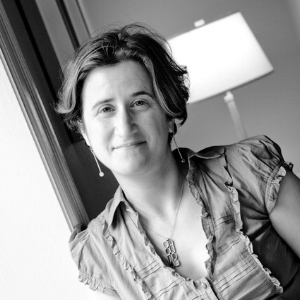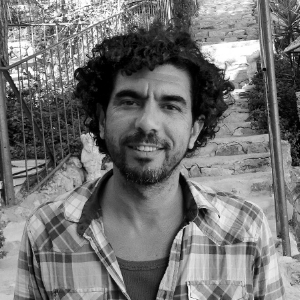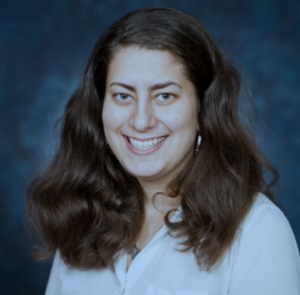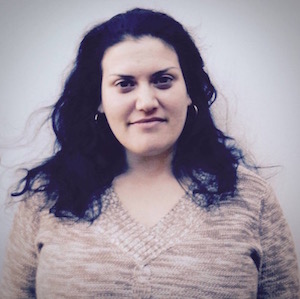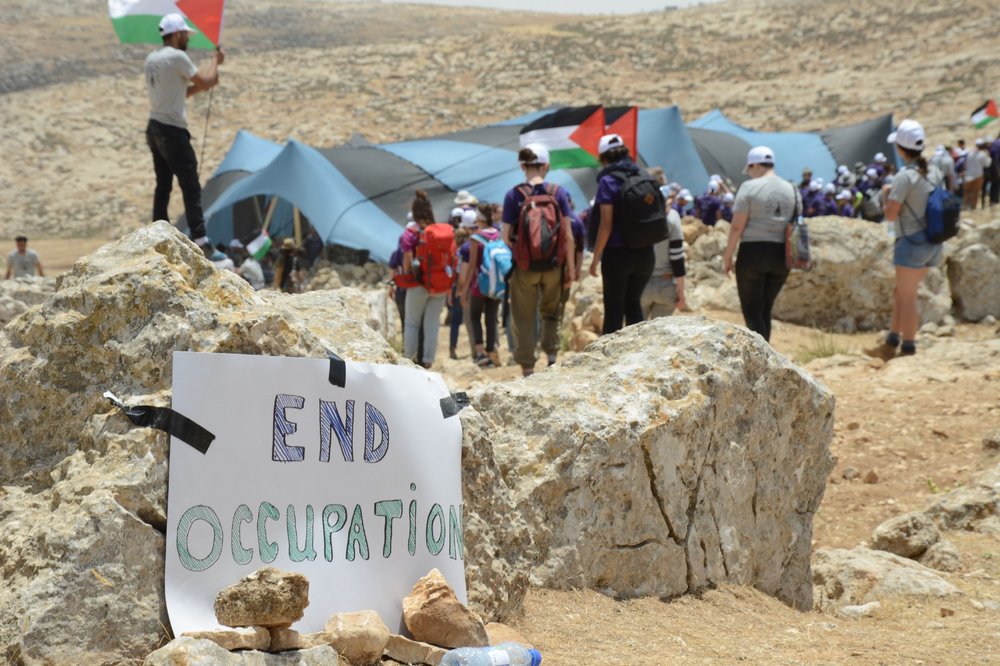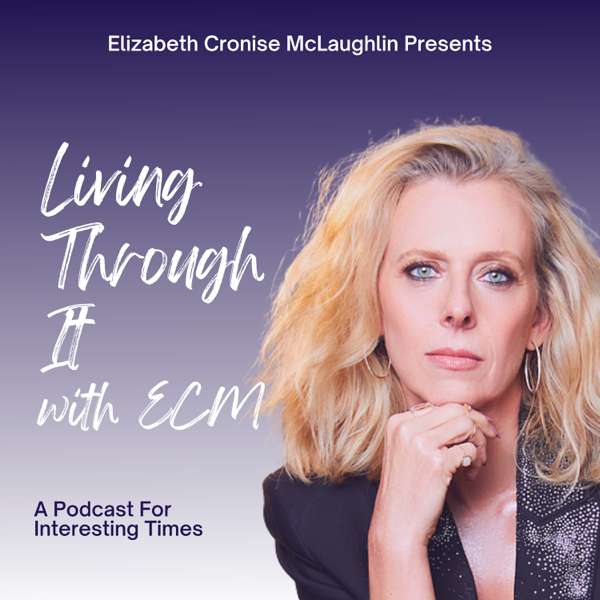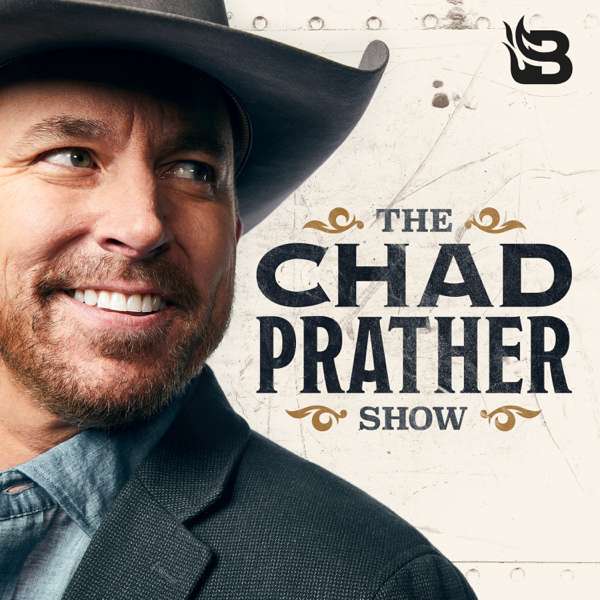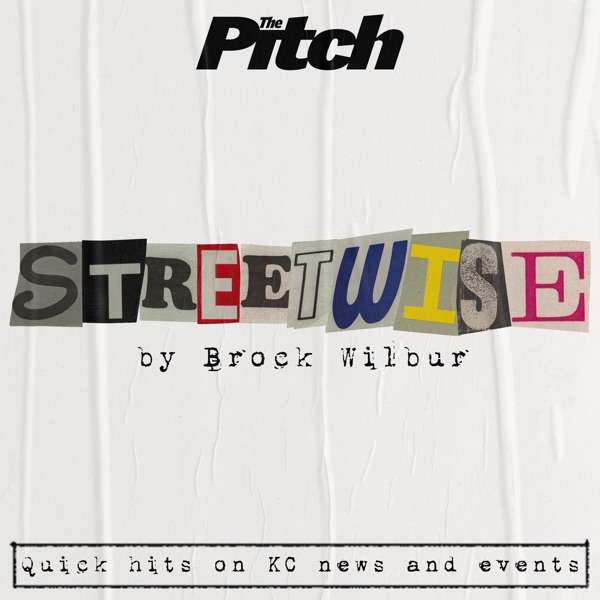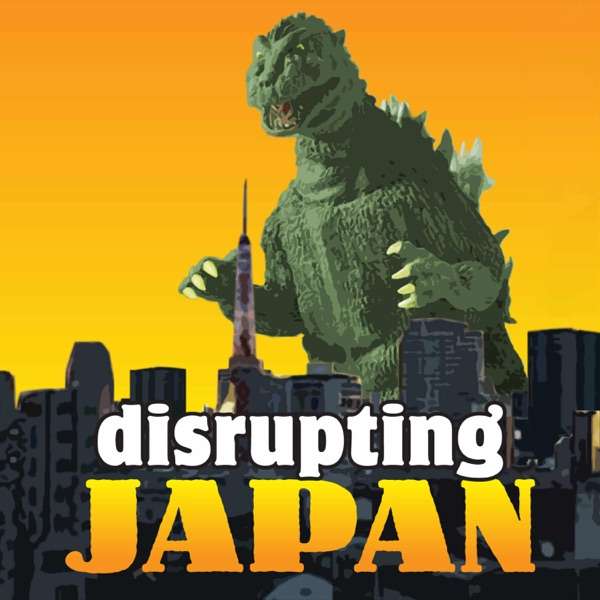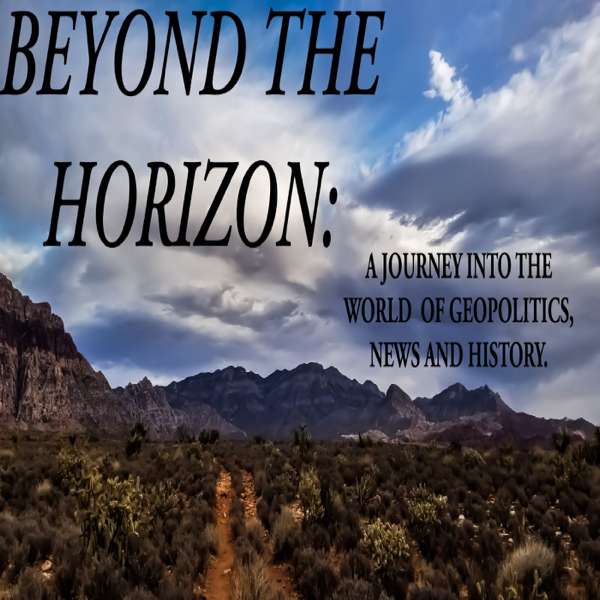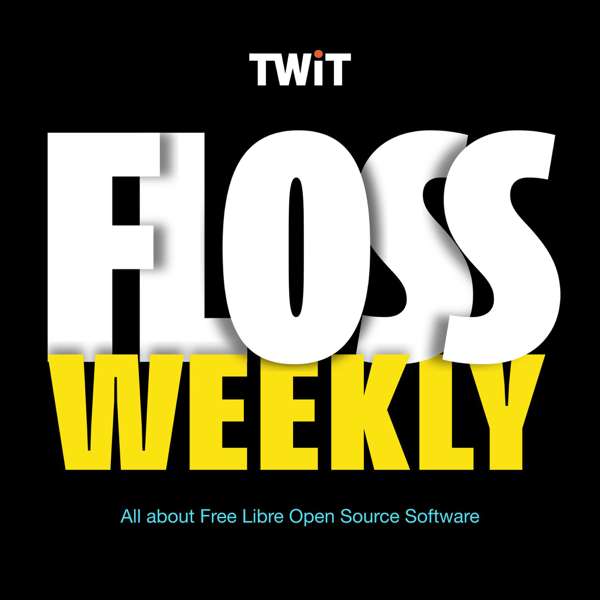Culture is the only human practice that can actually dig into the root of a trauma and try to undo it in the first place. And this is why people are so afraid of culture, and in particular theatre. ‘Cause when there’s a human being in front of you having an experience, it’s very difficult to ignore them. It’s hard to ignore a play.
— Dan Fishback
Dan Fishback and Motaz Malhees both made waves in the New York theater scene this fall with plays about Palestine. Motaz performed with the Freedom Theatre of Jenin in "The Siege," at the NYU Skirball Center. Meanwhile, Dan's play "Rubble Rubble" was abruptly and controversially cancelled by the American Jewish Historical Society.
In this joint interview, Dan and Motaz talk about their work, and explain why culture is their weapon of choice against the injustices of the occupation.
This episode of Unsettled is hosted by Max Freedman. Original music by Nat Rosenzweig. Recorded at The 'cast Sound Lab in Brooklyn, New York on November 6, 2017. Edited for length and clarity by Ilana Levinson.
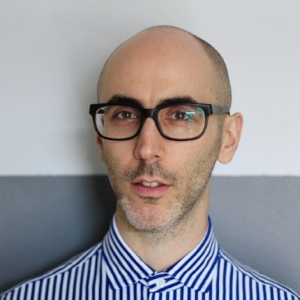
Photo credit: Sammy Tunis
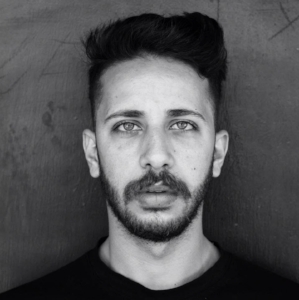
Dan Fishback is a playwright, performer, musician, and director of the Helix Queer Performance Network. His musical “The Material World” was called one of the Top Ten Plays of 2012 by Time Out New York. His play “You Will Experience Silence” was called “sassier and more fun than 'Angels in America'” by the Village Voice. Also a performing songwriter, Fishback has released several albums and toured Europe and North America, both solo and with his band Cheese On Bread. Other theater works include “Waiting for Barbara” (New Museum, 2013), “thirtynothing” (Dixon Place, 2011) and “No Direction Homo” (P.S. 122, 2006).
As director of the Helix Queer Performance Network, Fishback curates and organizes a range of festivals, workshops and public events, including the annual series, “La MaMa’s Squirts.” Fishback has received grants for his theater work from the Franklin Furnace Fund (2010) and the Six Points Fellowship for Emerging Jewish Artists (2007-2009). He has been a resident artist at Kelly Writers House at the University of Pennsylvania, the Hemispheric Institute at NYU, the Kimmel Harding Nelson Center, Yaddo, the MacDowell Colony, and BAX/Brooklyn Arts Exchange, where he has developed all of his theater work since 2010. Fishback is a proud member of the Jewish Voice for Peace Artist Council. He is currently developing two new musicals, “Rubble Rubble” and “Water Signs,” and will release a new album by Cheese On Bread in 2018.
Motaz Malhees is a Palestinian actor born in 1992. He received his professional training in Stanislavsky, Brecht and Shakespeare at The Freedom Theatre in Jenin Refugee Camp (Palestine), and in Commedia dell’Arte at Theatre Hotel Courage in Amsterdam (Holland). Motaz has trained with internationally acclaimed directors such as Juliano Mer-Khamis and Nabil Al-Raee (The Freedom Theatre), Di Trevis (Royal Shakespeare Company), Thomas Ostermeier (Schaubühne Theatre), and Katrien van Beurden (Theatre Hotel Courage). His stage credits with The Freedom Theatre include: “Alice in Wonderland” (2011), “What Else – Sho Kman?” (2011), Pinter’s “The Caretaker” (2012), “Freaky Boy” (2012), “Courage, Ouda, Courage” (2013), “Suicide Note from Palestine” (2014), “Power/Poison” (2014), and most recently “The Siege” at the NYU Skirball Center. Motaz has also acted in films, including: “Think Out of the Box” (2014, dir. Mohammad Dasoqe), which screened in Palestine, Germany and Mexico; and “Past Tense Continuous” (2014, dir. Dima Hourani).
As a versatile actor, Motaz has performed in multilingual plays as well as in scripted, devised, physical, epic and fantasy theatre. Motaz also produces and performs in short films about social issues in Palestine, which have received a wide following on social media platforms. Having grown up in Palestine, and experienced the economic and political hardships of life under occupation, Motaz has been actively interested in acting since he was nine years old. He lives through theatre, and believes in the potential of art to transform people’s ideas and lives.
REFERENCES
- "Arna's Children" (dir. Juliano Mer-Khamis, 2004)
- "The Life and Death of Juliano Mer-Khamis" (Adam Shatz, London Review of Books, November 2013)
- "Center for Jewish History Chief Comes Under Fierce Attack By Right-Wingers" (Josh Nathan-Kazis, Forward, September 6, 2017)
- "Jewish Center Faces Backlash After Canceling Play Criticized as Anti-Israel" (Jennifer Schuessler, New York Times_, _October 11, 2017)
- Program note by Oskar Eustis for "The Siege" at NYU Skirball Center (October 2017)
- Indiegogo campaign for Dan Fishback's "Rubble Rubble"
- "Return to Palestine"(The Freedom Theatre, 2016) in Arabic without subtitles
- Theatre of the Oppressed NYC
- Housing Works
- "All Your Sisters" (Cheese On Bread, 2017)
- danfishback.com
- @motazmalhees
- thefreedomtheatre.org
TRANSCRIPT
DAN: So many people warned me against making work like this. And yeah, I got canceled, but in the process, I have tremendously powerful friends now that I didn't make before.
MOTAZ: Doesn't it make you stronger after they cancel it?
DAN: Yeah, of course. Yeah.
MOTAZ: Didn't it make you more like want to do it?
DAN: Oh, yeah.
MOTAZ: That's a good thing, then.
[MUSIC: Unsettled theme by Nat Rosenzweig]
MAX: Welcome to Unsettled. My name is Max Freedman, I’m one of the producers of Unsettled and your host for today’s episode.
Now when I’m not working on this podcast, I’m a theater artist, and I know how hard it can be to make a life in the theater and get your work out there. However hard you think it is, imagine you’re trying to tell stories about the occupied West Bank.
Enter Dan Fishback and Motaz Malhees.
Dan and Motaz both made waves in the New York theater scene this fall with plays about Palestine.
Motaz was in New York performing with the Freedom Theatre of Jenin in “The Siege,” a play about the Israeli siege of the Church of the Nativity in Bethlehem, during the Second Intifada.
Dan, on the other hand, made waves because of a play that didn’t happen, rather than one that did. His play, “Rubble Rubble,” was supposed to go up at the American Jewish Historical Society, but they cancelled it. I’ll let him tell you why -- and what happened next.
Dan and Motaz didn’t know each other before, but I had the privilege to get them in the same room to talk about their work and as you’ll hear, they had a lot in common.
In preparation for this interview, I dug through years of old journals and found my entry from the day I first met Motaz, when I was in Jenin, three summers ago. Really big and underlined a few times, I had written two words: CULTURAL RESISTANCE. So that’s our theme for today.
Quick note: besides the three of us, at one point you’ll hear the voice of my co-producer Ilana Levinson. I think that’s all you need to know, so, let’s get started!
MAX: Welcome to Unsettled. Uh, why don't you start by introducing yourselves?
MOTAZ: Eh, first of all I am so happy to be here with you guys that's before I introduce myself. I am Motaz Malhees, so I am an actor from Palestine, I used to work with the Freedom Theatre since 2010. I do a lot of politics theatre but also the same time I do also for community, I do like for kids show. But I feel like, whatever needs, I give, like...it’s not important the type of theatre I do. But nowadays I'm freelance, and I work like with all theatres in Palestine, my country, because I don't want to be just involved with one place -- even that's I always say that the Freedom Theatre, that's my place and my home.
DAN: I’m Dan Fishback, I’m a...I make performance and music and theatre in New York, I’ve been here since 2003 -- I don't know, what do you want to know?
MAX: Where’d you grow up?
DAN: Oh my gosh! I grew up in a pretty normal American Reform Jewish family, outside Washington, DC in Maryland. In a family that...was essentially a liberal Zionist family, although I don't think they would have necessary articulated themselves like that, they just imagine themselves being normal.
And I heard growing up, “If only the Palestinians were nonviolent, then they would get what they want. Because they're asking for something reasonable, but it's because they're violent that things are problem....that that's the reason why there's a problem.” And like, the older people around me as I was growing up were always saying, “If only there was a Palestinian Gandhi” -- that was like the refrain, over and over again. And now I find myself 36 years old, going back to my communities and being like, “There’s this huge non-violent Palestinian movement! And it’s international and we can be part of it, it’s boycott, and blah blah blah.” And everyone’s like, “Oh no, no no, this makes us uncomfortable too.” I'm like, “This is what you were begging for my whole childhood! And now it’s here! Why aren’t you excited? Why aren't you as excited as I am?” That’s where I’m from.
MOTAZ: That’s cool.
DAN: And it’s an honor to be here with Motaz, whose performance in “The Siege” was absolutely amazing.
MOTAZ: We not sure, but there is like people who really want to bring it back to the U.S. again, because it was a really successful show like for the Skirball Theatre, even like they almost sold out.
MAX: Let me back you up a second, because, I want you to imagine that I have never heard of “The Siege,” have never heard of the Freedom Theatre. Can you tell me -- tell me what it was, tell me what it is.
MOTAZ: “The Siege” it's a story about the invasion happened in 2002 in Palestine. There was like eh...invasion for the whole West Bank: in Jenin, in Nablus, all the cities. Like, one of them was Bethlehem, and in Bethlehem there was like a group of fighters, freedom fighters, who fight and defend back from their homeland. They have like many guns defending themselves, and they have in the other side -- the Israeli side -- there is tanks, Apache, Jeeps, all kind of guns you can imagine your life, heavy guns. And they were like around 45 fighters, 250, 245 civilian -- priests, nuns, children, women, and men, from both different religions -- who’s like stuck inside the Nativity Church for 39 days. With the like first five days they have food, after that they have no food. And they surrounded with around 60,000 soldiers from the Israeli army. They want, like, to finish it. So they, they have pressure, they don't wanna -- even the fighters, says khalas, it’s enough. Their people are suffering, their families are suffering outside because of that. So, they sent them like a paper, they have to write their names, the number of their IDs they have, and their signature. So, the fighters sign on it, and they know that's thirteen going to Europe and twenty-five are going to Gaza. They don't know even where they going. So, they sent them to exile the same day.
DAN: When my friends and I were leaving the theatre, all we were talking about is, we were so curious about what their lives would be like after fifteen years of exile and we couldn’t wrap our minds around it.
MOTAZ: I know one of them is personally, and he told me a lot about it. And it’s really important to bring this piece because of one reason: they didn't choose. Even they signed the paper that say they have to go to exile, but like they was under pressure, and they thought it's temporary and that they would return. And eh, I know how much they are really broken from inside. They never show this to people.But from inside, if you know them personally, they are really broken, and they just...all they want, just to see like at least their families. Some of them, they can’t. Their family, like they can't get the visa to go to visit them -- like, for example, the two guys, Rami Kamel, and Jihadi Jaara who living in Dublin, they haven't seen their families at all. One of them, like Jihadi he have a son that's his wife give birth like after one week he was sent to exile. He didn't even touch his son, he's fifteen years old, like...at least, like, okay, you don't want to send him back to Palestine. Let his family visit him! Like, this is the minimum of humanity. And eh...a really important point we have like always to say: those people was in their homeland, they was in their own city, and they fight back. They didn't went to...yeah, to Tel Aviv to fight, or to somewhere inside Israel, to fight the people over there. They was fighting the…defending themselves from the Israeli army.
MAX: How did you get started with the Freedom Theatre?
MOTAZ: Woo hoo! Since I was like, eh…fourteen I heard about it, or thirteen -- and I was dreaming about to be in there cause I’m, since like eight, nine, I start doing acting. It's like something I really love from inside, like I really really want to be an actor. Not because like I wanted a name. Because I can hold the stories, I can share stories for all over the world, I enjoy it, it's something beautiful and strong in the same time. So when I was sixteen, I heard about the hip-hop workshop, dance hip-hop workshop in the Freedom Theatre. So I went there and I apply for it, and I get involved with the workshop, and the last few days Juliano just came and he said, “We open a new class for theatre.”
MAX: Juliano, who Motaz just mentioned, is Juliano Mer Khamis, who started what is today, the Freedom Theatre. Real quick, I want to tell you the remarkable story of the Freedom Theatre of Jenin.
During the First Intifada, Juliano’s mother, a Jewish Israeli Communist named Arna Mer, came to Jenin, where she helped to establish housing and educational programs for children in the refugee camp there -- and eventually a children’s theatre called The Stone. Arna died of cancer in 1995, and during the Second Intifada, the Stone Theatre was destroyed. Arna’s son Juliano returned to Jenin for the first time since his mother’s death in the immediate aftermath of the Battle of Jenin, and made an incredible film called "Arna’s Children" -- Motaz will tell you more about this in a bit, but it’s on YouTube and I highly recommend it.
It was after finishing this film that Juliano returned again to Jenin to found the Freedom Theatre. In 2011, Juliano was assassinated, but the Freedom Theatre has persisted. Alright -- back to Motaz.
MOTAZ: So I get involved and I put myself in that place since 2010. And it’s been like around...now, now you could say like eight years almost. It is...hard and eh, good in the same time. It is, ‘cause you face emotion, a lot of different emotion. But I love it. It's like, it’s become my home now. I’m always there. Even if I have nothing, I go pass by drinking coffee there like, chill, see what's going on, if they need help or something, because I'm part of the family.
MAX: Well we met because I went to visit the Freedom Theatre. And you were just hanging around and we sat there and talked for an hour.
MOTAZ: Yeah yeah.
MAX: Alright, so, Dan.
DAN: Yeah.
MAX: Tell me about your work and particularly tell me about “Rubble Rubble” and the genesis of that project.
MOTAZ: I wanna hear about it.
DAN: Well I've been working for the past decade on a trilogy of plays that sort of explore the inner life of the Jewish left in the United States over the past century. And this last play, “Rubble Rubble,” which I've been developing for the past few years, starts in the West Bank in an Israeli settlement. And you find this family that I've been writing plays about -- which is a very far leftist socialist radical family -- you see that that family has split off, and there's like a right-wing side of the family that has become settlers. And the left-wing anti-Zionist member of their family travels to visit them, after they haven’t spoken in twenty years.
MOTAZ: Whoa.
DAN: And the family confronts each other over his huge chasm, where one person is like a Palestinian solidarity BDS supporter and the rest of the family are like...
MOTAZ: Pro-Israel.
DAN: They're like settlers! Like living on stolen land, even though, but they’re middle aged American Jews who in the sixties were like radical New Left, you know, people. I’m fascinated by how many American-Israeli Jews were like super far on the left in the United States and then became these horrible oppressors in Israel. It blows my mind that it's possible to make that transition within the course of one life. And so, and that's where the play starts, and um…and I've been developing it for a few years, I went to Israel-Palestine to research for the play, I spent two weeks with interfaith peace builders traveling all through the West Bank and meeting with different non violent Palestinian and Israeli activists. I spent a week interviewing settlers, which was extremely disturbing.
Um, and then I’ve been developing this play, and it was gonna have its first public reading at the American Jewish Historical Society in Manhattan and, um, a couple weeks ago -- I guess now around a month ago -- we went to their offices for a meeting and everything was very positive, they were very excited to have us, the staff was very supportive of the work. And we heard that there was a right-wing smear campaign against the organization's new CEO. And we were told, “This is all happening but don't let it bother you. We might have to cancel that other thing, but we're not going to cancel your play, because we, we're really excited about it.” And literally the conversation we had was about raising the budget for our play. Eight hours later, I got an email saying that the play had been canceled.
MOTAZ: What? Was there any explanation about it?
DAN: Well, I knew that it was... The institution itself never sent me like a formal letter or anything, but I knew that it was because of this right-wing Zionist pressure campaign that they were being pressured to fire their new CEO, and in order to try to get rid of that critique, they were just going to get rid of us. And the staff of the American Jewish Historical Society was very supportive of me, and I don't see them as my enemies at all. It was the board of directors, or at least a small group from the board, met in the middle of the night and made this decision. And this is what happens all the time in Jewish organizations: the people actually doing work are willing to make brave choices, and the people who are funding that work are not willing to let anyone make those choices.
MOTAZ: Yeah yeah yeah, this happened with the same thing almost with us.
DAN: Yeah, at the Public, right?
MOTAZ: Yeah yeah yeah, it's almost the same, I like, I don't know who’s stand with us or who is against us, but we had this question for Oskar, which is the Artistic Director of the Public Theater, and his answer was really diplomatic answer and I respect -- no Oskar, he’s really great guy and he was one of the supporters to bring this play over here, and the most important thing, he says, that's to bring “The Siege” for the New Yorker people and we did it. It’s not about the place.
DAN: Well, that was interesting about Oskar Eustis and “The Siege,” is that it was supposed to be at the Public Theater, the board canceled that choice. But Oskar, who is the Artistic Director of the Public Theater, he had notes in the program for “The Siege” production at the Skirball Center. And I was like, this is so unusual that you open the program and you see notes from the director of the theatre that canceled the play!
MOTAZ: Yeah yeah. But, I want to hear more about Dan play, man.
DAN: Sure, yeah.
MOTAZ: I would like to know what is the story?
DAN: Well, I can tell you about the story of what happens in the play, but what I also want to say is that, after we were canceled, the New York theatre world became incredibly supportive of us. And people really came out of nowhere to offer support and offer help. We raised our budget that had been canceled from American Jewish Historical Society within three days.
MOTAZ: Whoa.
DAN: Yeah. And we were offered resources that we couldn't have ever imagined. And to me, that was a huge sign that the people who are trying to censor dissident voices around Israel-Palestine are going to fail in humiliation. Because our work is stronger than ever after having been canceled, because people are so angry about it. People who are, who don't really know very much about it, are angry about it. And there are left-wing Zionists in my life who don't agree with me, but who are so angry that the play was canceled -- and it’s put them in a situation where they are more open to my ideas, and more open to considering the ideas of the play. So, I mean -- and we’re going to do the reading of the play, it's going happen next year, the details aren't confirmed, but it's going to be bigger and more interesting and more spectacular than it would have been if it hadn’t been canceled in the first place. Which is interesting.
The play itself -- it’s funny because the people who canceled it never read it. And it's weird, like if they read it I think they'd be like, “Oh, this is weird.” It's a weird play.
The first act is like a very traditional living room drama in a family. So, there's the aunt and uncle, who are middle-aged formerly left-wing radical American Jews who live in a settlement. There's their radical nephew, who shares my politics but is not a sympathetic person. He’s kind of...nasty and annoying and neurotic. And he’s there with his partner who’s Colombian and has no context for any of this. So I really wanted there to be a character who doesn't really have any stake in the game, doesn't have any history with Israel-Palestine, just comes from another part of the world entirely, but who has...a personal history of violence. Because he grew up in a part of Colombia that experienced a lot of violence. Whereas, I think a lot of white American Jews, violence, revolution, all these ideas are abstract concepts, and we don't experience them in our real lives. So he's coming at -- that character, who in a way is the central character of the play -- is coming at things from a totally different context. And I don't want to give anything away, but by the end of the first act, things go horribly wrong, and the first act ends with an enormous disaster.
And the second act begins, and it's a musical, and it takes place in Moscow in 1905. And it's the same family, but a century before, and the matriarch of the family is building bombs for the socialist revolution of 1905.
MOTAZ: So it’s almost flashback?
DAN: It’s like a flash -- it's like an ancestral flashback.
MOTAZ: That’s interesting.
DAN: So you see the ancestor of the same family, and she's like a socialist revolutionary. She's building a bomb, she wants to like blow up the Tsar. And...and the ideas of the first act are sort of filtered through the music of the second act, where you see her with her socialist comrades. And what I want to ask is: How did this family go from here to there? How did it get from one place to the other? And, and the other question that I'm really interested in asking is like: Once you learn that there's an enormous injustice around you, how far are you willing to go to stop it from happening? How much violence are you willing to accept in order to stop something? Which is a huge question, I think, for anti-Zionist Jews when it comes to Palestine, like how...what are we supposed to do, knowing this horrible thing is going on? It's a huge question within Palestinian society, obviously, like what are you willing to do to stop this from happening? And it’s been a huge question throughout Jewish political history, which is full of violent resistance to injustice, and we act like were so horrified by violence, but Jewish history is full of it.
So, those are the questions that I'm dealing with, and I don't think that the play offers any straightforward answers. And that's the interesting thing about the play being canceled or censored, is that the play itself is about what happens when two sides of a Jewish family can't communicate, and shun each other. And that’s what’s happened with the play, that we were being shunned just like family members are being shunned. And when I was in Israel, researching the play, and I would tell people what the play was about -- you know, it's about a Jewish family that's separated over Israel, and the Israeli side doesn't talk to the American side -- and every single person I talked to was like, “Oh, that's just like my family. That's my family, that happened to us.” And I was like, oh, right. This is bad for everybody. This destroys families, this injustice is destroying everybody involved in it.
MOTAZ: Yeah, I mean like, even if it’s happened, like something like, my grandparents, whatever it takes place, I will not do the same thing in a different place.
DAN: Right? This is the big Jewish catastrophe of the twentieth century, that you take one of two decisions, right? You either, you take all the trauma and you say, “This will never happen to us again, and we will do anything to protect us.” Or you say, “This will never happen to anyone again.”
MOTAZ: What, like, Jewish used to live in Yemen, Morocco, Egypt, Palestine, many Arab countries, there was normal to see like this Muslim, Christian and a Jewish neighbor and eh, like an atheist beside him, and all of them are living in the Arab world like normally, like -- let's be honest, even though the Arab history is not clear, like there is many bad things from the Arab history also like... But eh, we used to live like together, so the thing is not religion. I don’t believe it’s religion, it’s mentality. It’s...
DAN: I was talking, I was having an argument in a restaurant a couple years ago with a Zionist Jew, and we were fighting really passionately. And someone, a stranger came up to our table and said, “Guys, stop fighting about this. It's an ancient struggle that's been going on thousands of years.” And we both looked at him, both of us agreed, we were like, “No, it isn't! This is new, this is in the past like less than 200 years that this has happened, come on.” We were like, “Go sit down. Finish your lunch, hon. Get out of our faces.” There's so many lies about it. But this is...I feel like this is the work, this is the cultural work of American Jewishness right now. We've been brought up with such a distorted understanding of the world. And it's gonna take so much cultural work to undo it all.
MOTAZ: Yeah, and it's gonna make a lot of enemies at the same time.
DAN: Oh yeah. But I think my situation proves that it's also gonna get…it's not gonna be completely a disaster. You know, everyone -- so many people warned me against making work like this. And yeah, I got canceled, but in the process, I have tremendously powerful friends now that I didn't make before.
MOTAZ: Doesn't it make you stronger after they cancel it?
DAN: Yeah, of course. Yeah.
MOTAZ: Didn't it make you more like want to do it?
DAN: Oh, yeah.
MOTAZ: That's a good thing, then. Okay, what’s the next question?
MAX: So, for both of you, why is culture your weapon of choice?
MOTAZ: Woo hoo! Because eh… Dan, you go ahead.
DAN: ‘Cause its more powerful! Like…violence only ever creates more violence. I think this, like, even when it's necessary, it ends up being true. Culture is the only human practice that can actually dig into the root of a trauma and try to undo it in the first place. Um, and this is why people are so afraid of culture, and in particular theatre. ‘Cause when there's a human being in front of you having an experience, it’s very difficult to ignore them. It's hard to ignore a play. And, and so many…especially, so many American Zionist Jews are under -- on an emotional level, understand that their perspective is impossible. ‘Cause if you ask most American Jews, “Do you believe that it is right for a country to privilege one ethno-religious group over others?” Most of them will say, “No, that’s wrong. That is a wrong thing.” And then you say, “Well, what about Israel?” and they'll go, “Uhhhhhh…”
But the fundamental truth, the deeper truth is that none of us actually support this. It's, the the support for Israel is the more superficial belief. The deeper belief is that this is wrong. Good plays, good art, good visual art, good music, good anything about this will help strip away the sort of superficial attachment to the, to the story of Israel, and help people get to the deeper belief that supremacy is wrong. No matter who is supreme in any given situation, it will always be wrong.
ILANA: Sorry, I just wanna um, in the conversation about Zionism, I’m wondering...
DAN: Do you want me to define that?
ILANA: Yeah, I’m wondering specifically if you think any form of Zionism involves supremacy and that kind of thing.
DAN: You know, I identify as an anti-Zionist Jew, and a lot of people, a lot of people will say, “Oh, don't say that, because it’s icky, it makes us uncomfortable to say you're anti-Zionist. Because, 'cause what does that really mean.” And for me, if it was the early 1900s, maybe I would have identified as like a Cultural Zionist. But to me, the way the word Zionism functions in the world, it’s support for a Jewish state of Israel. And to me, that means that Zionism inherently requires one to believe that Jews should reign supreme in this land, and I think that that's an untenable option.
MAX: I…I sort of wanna respond.
DAN: You wanna get into it, Max?
MAX: No, I don't -- no, I don’t wanna argue with you…that's not… I will confess that I am skeptical of people who call themselves anti-Zionists who are not Jewish and not Palestinian. I...
DAN: Yeah yeah yeah, me too. I think that part of the, part of what it means to liberate Jews in the world, is to liberate us from our trauma, and to liberate us from that pain that…that distracts us from the reality of the world. And that requires our friends to help us get through that trauma, and to help us liberate ourselves from that trauma, and that requires non-Jewish people who oppose Zionism to make sure that we are emotionally capable of, um, of joining with them and being in community with them. And to me that's always like a challenge to my non-Jewish friends and comrades to be like, if we’re gonna do this together you need to understand that we’re…we just barely made it alive into this century, and a lot of us have like legitimate fears for our lives. I mean, we’re living in the United States where there's like a Nazi problem, right? Like our fear of violence is real and legitimate and um, when people say there's like no anti-semitism on the left in the United States, to me that's like so foolish. Like obviously, there's some anti-semitism in any part of the world, in any community.
MOTAZ: Of course, of course…that's true.
DAN: And when we pretend it doesn't exist, then we’re...I think we make so many other Jews feel unsafe joining us in this movement, because we're saying something that's obviously untrue and they don't trust us ‘cause it sounds like we’re lying to them. From my perspective, we need to say it: yeah, there's totally some anti-semitism on the left. And we need to deal with it, and our non-Jewish comrades need to deal with it, so that we can see that this is a safe place for us to be.
MOTAZ: Nobody called you before, like you are anti-semitic after all the things you did?
DAN: Oh yeah.
MOTAZ: And you are Jewish.
DAN: Oh yeah. Motaz, I need to tell you, I've gotten a lot of hate mail in my life and it's never as aggressive as other Jews. They’re the ones that tell me I should die. What they always say is, “You should go to Palestine, where they’d kill you.” They say this all the time, and I’m like, “I’ve been to Palestine, dude!”
MOTAZ: So if some of the guys gonna hear this interview, Dan, you more than welcome in my house in Jenin. Nobody gonna kill you, you gonna love it. So come back to the first question?
MAX: Yes, yes, finally...
MOTAZ: Why cultural... Because I'm fed up. I have seen like many people got killed in this entire world since I was born. And see blood everywhere, why it’s need to be violent? Why that question? Why don't we turn the opposite question: why we have to be violent? Because it's like, we fed up, we are like, we are human.
There is many people that think, like, “Oh, they was born like this.” No, they was not born like this. There is something happen to them. Like, if you watch there is a really important and good movie, it’s called “Arna’s Children,” Little kids, he talking about this story a lot, little kids. And they was dreaming about to be a Romeo of Palestine, them want to be Juliet, one of them he want to be Al Pacino. They wanna be actors. Suddenly, in a moment in 2002, you see those people got killed. And they became a freedom fighter before. Why? One of them his mother got killed by a sniper. One of them, after they bomb a school, he went to the school and he grabbed the body of a girl and she was almost alive, while he was running through the hospital, she died. So, his...of course he was gonna have a flip in his mind, and he gonna hold the gun and fight. So those people, they didn't like came from nothing. There is a reason always to do this.
Even like I'm not into like guns or things, that's why I choose also art because I believe art is more stronger than a gun. And I don’t want to see any person on earth suffer. Like death is coming anyway, like you gonna die, but why we have to kill each other? Destroying, destroying. Like, I can make art which is strong, I can bring the messages, not just from my place, from all over the world and develop it to the stage. And eh… I think it's, let's make it, let's be cultural more. Let's let the art talk. And eh, we not gonna fake history, we not gonna fake stories, we gonna bring the story as it is.
DAN: And this is why they’re so afraid of theatre.
MOTAZ: Yeah!
DAN: Because theatre shows the reasons why a person does something, and they don't wanna look at the reasons.
MOTAZ: Man, I start to believe in this thing in 2012. I was going to the theatre in a taxi and there was checkpoint, and they stop me. ‘Cause I have no ID. I told him, like “I’m late for my theatre.” And he said, “Oh, you’re going to the Freedom Theatre.” He said like, “Come on man, they killed Juliano, they could kill you too.” And I said like “Why?” He said like, “Art will not change anything man. Why you need it?” And I said, “It's fine, for you it's nothing, but for me...” And he told me, “If you don't have your ID next time, you go to prison. And I promise you.” So since that time I just realize how much art is strong, and how much they afraid from art.
MAX: Here’s Motaz in a scene from “Return to Palestine,” devised by graduates of the Freedom Theatre acting school.
[Excerpt from "Return to Palestine," in Arabic]
MAX: So, the work I do here in New York City is mostly with an organization called Theatre of the Oppressed NYC.
MOTAZ: Yeah, I know.
MAX: Where I work with a lot of different groups of people. Right now I’m working at Housing Works, which is an organization that um…I think this is the blurb from their website, “works to end the twin crises of HIV/AIDS and homelessness.”
MOTAZ: Whoa.
DAN: Easy.
MAX: Yeah, right? I’m working with a group of folks from Housing Works on a play that they created about their experiences trying to keep and get affordable housing, with housing vouchers that they have because of their status. And… that’s just one example, I’ve worked on a lot of plays, and the way that sometimes I think about what those plays are meant to do, is is kind of in two areas: there’s the sort of, I mean, the way that I talk about it with my family, which is very much in the kind of like raising awareness camp, in the sense that people come to see these plays, they don’t know anything about tenant harassment in New York City and they learn about it. And then, really what it was designed to do by the folks who came up with this stuff in Brazil in the seventies, which is to build capacity in that community. Um, these theater tools are tools for people to work together to make change. I’m wondering if that resonates with you at all, and sort of -- what do you see your work in theater doing?
DAN: Obviously I like plays that do all of these things at the same time.
MOTAZ: Yeah.
DAN: But, as a playwright, if you go into a project with too much of a vision of like what kind of responses you want from your audience -- an audience knows when you’re trying to manipulate them, and at the end of the day, an audience knows when something is authentic. So, being a playwright is about balancing your vision for what you want to happen in the room, and your relationship to your own imagination and your own impulses.
MOTAZ: And the thing is like, if you don’t believe it, the actors will never believe it, then the audience will never believe it.
DAN: Yeah, totally, and a lot of political theatre gets a bad rap, because I think a lot of political theatre is only thinking about, how can we make an impact with this audience? And it feels false.
MOTAZ: I’m interested to know about, Dan, like -- normally, when you write, you give solution for the people? Or you give them a question to find the solution?
DAN: I don’t give solutions, no.
MOTAZ: You give a question.
DAN: I give the questions. Yeah yeah yeah yeah.
MOTAZ: Good, yeah.
DAN: If I feel like I know concretely an answer to something, then I don’t need to write the play. I will just write an essay.
[MUSIC: Cheese on Bread, “All Your Sisters”]
MAX: Motaz had to leave, and I got to talk to Dan for a little while longer about the difference between boycott and censorship, and why he wants to start identifying as a “liberationist Jew.” If you’re not already subscribed, SUBSCRIBE to Unsettled on your podcatcher of choice -- because, in a couple weeks, you’ll get a bonus episode with the rest of our conversation.
In the meantime, you can find Dan’s work at his website, danfishback.com, and follow Motaz on Instagram @motazmalhees, that’s M-O-T-A-Z-M-A-L-H-E-E-S.
The song you’ve been hearing is "All Your Sisters" by Dan Fishback’s band, Cheese On Bread, from their forthcoming album "The One Who Wanted More,” coming out next year.
You can find the song, a full transcript of the episode and other resources at our website, unsettledpod.com.
Unsettled is produced by Emily Bell, Asaf Calderon, Yoshi Fields, Ilana Levinson, and me. This episode was edited by Ilana Levinson. Original music by Nat Rosenzweig. We recorded this episode in a studio for the first time -- shout out to Cast Sound Lab in Brooklyn, New York.
Go to our website, unsettledpod.com, for more show information. We want to bring you more content in more different forms, and to make that happen, we need your support! So you can become a monthly sustainer at Patreon.com/unsettled.
You can like Unsettled on Facebook, follow us on Twitter and Instagram, and subscribe on Apple Podcasts, Google Play, Stitcher, Overcast, or wherever you get your podcasts, to make sure you never miss an episode of Unsettled.

 Our TOPPODCAST Picks
Our TOPPODCAST Picks  Stay Connected
Stay Connected


